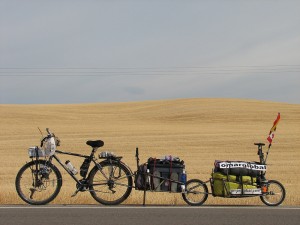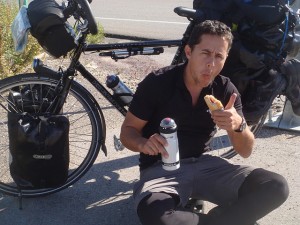Stories of bicycle travellers & free weblogs for biketravellers!
How to get sponsoring for a bicycle trip?
Last week, I received the following question by email:
I’m starting a solo trip in May from Alaska to Argentina. I’m using this trip not only for my own desires, but to raise awareness and funds for an organization that aims at putting an end to factory farming and animal abuse in said farms.
I’m only at the beginning stages of preparation at this point. I noticed you have obtained sponsors for your trip. This is something I’m very interested in, as I have very limited resources and can use all the help I can get. I’m here to ask you for advice on how to obtain sponsorship. If you could give me some help as to how you went about getting sponsors, it would be greatly appreciated.
I replied the following, which might be helpful for others:
Thanks for your email. Great you are going to do it. I am not sure if you already have a blog, but you can open one for free at http://BikeTravellers.com. About the Sponsoring: do not get your hopes up too high. Basically I got sponsored, because I am already a well-known (published) writer, climber and photographer. Still many, many more said no and financial support is non-existent.
Please read this FAQ on my other website, 7summits.com. It is about climbing, but the same applies to cycling expeditions. Here are some parts from that FAQ:
Q: I want to climb, but where can I get the money? Will people sponsor me?
A: There is no golden rule for getting sponsoring or money to climb.
Most of the trips (besides Everest and Vinson) are reasonably priced, so some hard work and savings should get you a long way there. It will be nice to get some sponsors, but think from their position: why would strangers give you money to climb a mountain?
Do not lower yourself to promote yourself as the ‘first lefthanded Scandinavian-American’, ‘the couple with the biggest age difference’, ‘the Youngest from Nowhereville’ etc. Both sponsors as other climbers are quite tired of these claims and most of them are not true anyway as they can hardly be checked. You need to have some real value in order to get sponsors.
All the famous and sponsored climbers got sponsoring after they climbed a lot, not before. Even then, you will have to prove to them that you are worthy of their money and that you can deliver at least the same value back to them. Never climb anything if you are dependent on sponsoring only, you should always be able to fund it yourself, whether this means living in a tent in the forest for a long time (as Göran Kropp did), getting a huge loan from family or earning a lot of money by having a regular job.
Also, being free of sponsoring, means not having to pose for pictures on the summit, not having to think about the things you need to do for them and -most importantly- not having to behave like a beggar for years in order to get some funding. On average, the same time spent hunting for sponsors on an simply working an extra job will generate much more money with less strings attached.
Of course, not only the climbing itself is mental, but also the preparation. Money spent on climbing cannot be spent on something else, you will need to ake some choices. Not dining out, stopping with smoking and getting rid of a car will probably save most people enough to climb 2-3 of the 7summits per year. And even if they do not climb, the above will make them healthier anyway, saving loads of money on medical bills!
You can save a lot also by comparing the different operators. The same trip might cost double because the company has to pay for expensive brochures, hot-shot guides or simply because they have more profit. Then again, do not use false economics: many people tried to climb Kilimanjaro in 5 or 6 days as every extra day cost a few hundred dollars extra. Many of them had to come back later to finish the job: extra time off, new flights and other expenses that could have been prevented. Same for the lowest-priced Everest trips: you can save on food, tents, Sherpa’s and other services, but if this means lowering your summit chances or even risking your lives, you might want to reconsider.”
Actually, that was the entire FAQ, but if you substitute “Cyclist” for “Climber”, you will see that the above is true for biketravellers as well.
Good luck, hope to follow you on your blog!
Cheers,
Harry & Ivana
| Q: | I want to climb, but where can I get the money? Will people sponsor me? |
| A: |
There is no golden rule for getting sponsoring or money to climb.
Most of the trips (besides Everest and Vinson) are reasonably priced, so some hard work and savings should get you a long way there. It will be nice to get some sponsors, but think from their position: why would strangers give you money to climb a mountain? Do not lower yourself to promote yourself as the ‘first lefthanded Scandinavian-American’, ‘the couple with the biggest age difference’, ‘the Youngest from Nowhereville’ etc. Both sponsors as other climbers are quite tired of these claims and most of them are not true anyway as they can hardly be checked. You need to have some real value in order to get sponsors. All the famous and sponsored climbers got sponsoring after they climbed a lot, not before. Even then, you will have to prove to them that you are worthy of their money and that you can deliver at least the same value back to them. Never climb anything if you are dependent on sponsoring only, you should always be able to fund it yourself, whether this means living in a tent in the forest for a long time (as Göran Kropp did), getting a huge loan from family or earning a lot of money by having a regular job. Also, being free of sponsoring, means not having to pose for pictures on the summit, not having to think about the things you need to do for them and -most importantly- not having to behave like a beggar for years in order to get some funding. On average, the same time spent hunting for sponsors on an simply working an extra job will generate much more money with less strings attached. Of course, not only the climbing itself is mental, but also the preparation. Money spent on climbing cannot be spent on something else, you will need to ake some choices. Not dining out, stopping with smoking and getting rid of a car will probably save most people enough to climb 2-3 of the 7summits per year. And even if they do not climb, the above will make them healthier anyway, saving loads of money on medical bills! You can save a lot also by comparing the different operators. The same trip might cost double because the company has to pay for expensive brochures, hot-shot guides or simply because they have more profit. Then again, do not use false economics: many people tried to climb Kilimanjaro in 5 or 6 days as every extra day cost a few hundred dollars extra. Many of them had to come back later to finish the job: extra time off, new flights and other expenses that could have been prevented. Same for the lowest-priced Everest trips: you can save on food, tents, Sherpa’s and other services, but if this means lowering your summit chances or even risking your lives, you might want to reconsider. |
| This entry was posted by Harry on 1 September, 2009 at 1:02, and is filed under FAQ, Manual. Follow any responses to this post through RSS 2.0. You can leave a response or trackback from your own site. |




